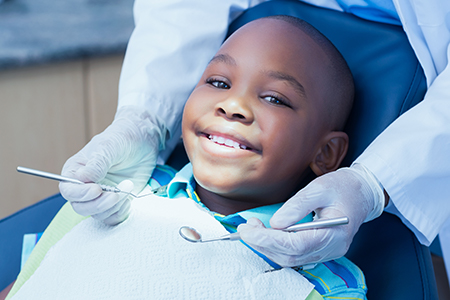New Patients
(860) 218-9463
Existing Patients
(860) 421-0144

At the office of Newpoint Family Dental, we focus on building healthy habits and positive experiences that set children up for a lifetime of good oral health. Our pediatric care blends gentle technique, clear communication, and practical prevention so families feel informed and confident about their child’s dental development.

Early dental visits are about more than checking teeth — they create a partnership between parents and dental professionals focused on prevention. By seeing a dentist around the time your child’s first tooth appears (or by their first birthday), you establish a consistent schedule of care and give your child the chance to become comfortable with the dental environment from the start.
During initial appointments we focus on straightforward things: examining tooth and gum health, offering guidance on home care, and answering questions about teething, pacifier use, or sleeping with a bottle. These visits are intentionally brief and friendly so a child’s first impressions are positive and stress-free.
Starting early also makes it easier to catch small concerns before they grow. When we track growth and development over time, small problems can be addressed with simple interventions rather than more invasive treatment later on. A proactive approach helps protect both oral health and overall well-being.
Children respond best to care that feels safe and predictable. Our team uses child-centered communication and a calm, reassuring manner to explain procedures in ways a child can understand. We tailor each visit to your child’s developmental level so they can cooperate comfortably while still receiving thorough care.
We also design the clinical experience to be as gentle as possible. From soft-touch cleanings to patient pacing and distraction techniques, the goal is to minimize anxiety and promote cooperation. If a child has special needs or heightened fear, we discuss options and plan visits to ensure comfort and safety.
Parents are an essential part of every appointment. We provide clear instructions and demonstrations so you can continue effective brushing and flossing at home, and we work with families to create routines that fit daily life without adding stress.

Regular checkups let us assess how teeth, gums, and bite are developing over time. At each visit we review your child’s medical and dental history, perform a careful clinical exam, and update any preventive measures such as fluoride application or sealant recommendations when appropriate.
Clinical exams include evaluation of the bite and jaw function as well as checks for early signs of decay or infection. When necessary, we use digital radiography to visualize areas that can’t be seen during a visual exam, helping us make informed recommendations while limiting exposure.
A professional cleaning removes plaque and debris from areas that are hard to reach with routine home care. These appointments also give us a chance to reinforce good habits and answer questions about brushing, toothpaste use, and how to manage common concerns like teething discomfort.
Tooth decay remains one of the most common chronic conditions affecting children, but it is largely preventable. Important preventive strategies include consistent brushing with an age-appropriate toothbrush and toothpaste, limiting frequent exposure to sugary drinks and snacks, and keeping to a regular schedule of dental checkups.
Professional treatments such as topical fluoride and dental sealants provide an extra layer of protection for children who are at higher risk for decay. These simple in-office measures can help shield susceptible grooves on the back teeth and reduce the chance of cavities forming.
We also provide tailored guidance for families managing habits that affect dental health—examples include safe approaches to pacifier weaning, strategies for eliminating nighttime bottles of milk or juice, and tips for transitioning toddlers to independent brushing with supervision.
Start an oral care routine early and keep it consistent so brushing becomes part of everyday life.
Choose age-appropriate toothbrushes and a smear or pea-sized amount of fluoride toothpaste based on your child’s age and guidance from your dentist.
Limit frequent snacking on sticky, sugary foods and replace sweetened drinks with water whenever possible.
Make dental visits regular — preventive care is more effective and less stressful than treatment after a problem develops.
Model good oral hygiene: children are more likely to follow routines they see practiced by parents and caregivers.
Encourage healthy snacking and balanced meals to support strong teeth and overall growth.
Help your child stop thumb or finger sucking at an appropriate age and seek guidance if the habit persists and affects tooth alignment.
Use a properly fitted mouthguard for organized sports or activities that pose a risk to the teeth.

Tooth development begins before birth and continues through childhood. Most babies start to get their first teeth between six and twelve months, and establishing gentle cleaning habits at that stage helps prevent early decay. Wiping gums after feedings and gently cleaning newly erupted teeth keeps the mouth healthy as new teeth emerge.
Parents often ask how to handle teething discomfort — simple measures like chilled teething rings, a cool washcloth, or gentle gum massage can ease symptoms. If you're ever unsure about symptoms or behavior, our team is available to offer reassurance and practical tips.
Because baby teeth serve important roles in chewing, speech development, and guiding the eruption of permanent teeth, protecting them matters. If a primary tooth is lost too early, we’ll evaluate whether a space-maintaining solution is needed to preserve alignment and support future dental development.
As children move through preschool and school years, their mouths undergo rapid change. Permanent teeth begin to erupt, bites evolve, and facial growth can influence alignment. We monitor these transitions closely and discuss appropriate timing for orthodontic evaluation if signs indicate early intervention might be beneficial.
Nutritional choices play a direct role in dental health. Foods high in calcium, protein, and vitamins support strong teeth and healthy gums, while frequent exposure to sugary or sticky foods increases decay risk. We work with families to create realistic, sustainable approaches to eating that support oral and overall health.
Keeping an eye on habits such as mouth breathing, prolonged pacifier use, or persistent thumb sucking is also important; these behaviors can affect jaw and tooth development. When needed, we collaborate with parents and other health professionals to develop a plan that supports healthy growth.
Occasionally, early signs of malalignment or bite problems become apparent long before all adult teeth are present. In those cases, timely referrals to an orthodontic specialist can allow for simpler, more effective treatment. We’ll explain what we’re seeing and recommend next steps so you can make informed decisions.
Small, practical adjustments at home add up: encouraging water between meals, limiting sugary beverages, and choosing whole foods and fresh fruit over candy help reduce cavity risk. For school-aged children, planning healthy snacks and packing water instead of sweetened drinks are easy ways to protect teeth throughout the day.
Kids play hard and accidents happen. Having a plan in place for dental injuries — from chipped teeth to a tooth that has been knocked out — makes a big difference in outcomes. We advise parents on immediate steps to take in common situations and on how to bring children in for prompt care when urgent treatment is needed.
Prevention is equally important: a custom-fitted mouthguard can protect teeth, lips, and jaw in many sports. We’ll help you decide whether a stock or custom mouthguard is best for your child’s activity level and provide fitting and follow-up care as needed.
When urgent attention is required, our team provides calm, focused care intended to resolve discomfort quickly and to preserve dental health. Our goal is always to return children to normal activities as safely and comfortably as possible.
In summary, a thoughtful, preventive approach to pediatric dentistry helps children grow into healthy, confident smiles. If you’d like to learn more about how we care for children or to discuss a specific concern, please contact us for more information.
A pedodontist is a dentist who has received advanced specialty training in meeting the dental needs of children from infancy to adolescence. Pedodontists, also referred to as "pediatric dentists," study child psychology, behavior management, caring for children with special needs, methods of handling oral/facial trauma, and various techniques for providing anesthesia and sedation. Pedodontists also understand the complexities of facial growth and development and have the clinical skills required to meet the dental needs of all children at every stage of development. Most of all, pedodontists are passionate about what they do and enjoy working with children. They strive to make every dental experience a positive one as they help children establish a strong foundation for good oral health.
Even before your child is born, their first set of teeth is already forming. In fact, by one year of age, some of your baby's front teeth will have already come into place. While the arrival of your baby's first teeth is only one of many developmental milestones, it represents an excellent time to begin a program of oral care. According to recommendations from the American Dental Association, babies should see the dentist around the time of their first birthdays.
Your baby's first teeth typically begin to appear in the 6 to 12-month range. While this is an extraordinary milestone, you need to be aware that your baby may find the experience a little bit uncomfortable. Teething can make babies feel irritable. They may be fussy, have trouble sleeping, not want to eat, and drool quite a bit.
Although you are powerless to speed up the process of teething, there are a few things that you can do to soothe your baby as the new teeth are erupting into place. Common approaches to helping your baby feel more comfortable while getting new teeth, include teething rings or a cold spoon or moist gauze rubbed over their gums.
Even for these few new teeth, it's absolutely essential to establish an effective regimen of oral care. For information on when your baby's first set of teeth will erupt into place, consult this timeline from the American Dental Association: Eruption Charts
Some children persist in sucking their thumbs or fingers beyond their preschool years. For these children, the activity continues to be a source of comfort, relaxation, and security. It may even help them fall asleep at night. However, it's essential to be aware that in the long-term, a finger sucking habit is not healthy.
If your child's thumb or finger sucking habit is still present when the permanent teeth begin to come in, your child is at a higher risk of developing a bad bite. By the age of five or six years, you need to constructively and gently help your child stop the habit.
It's also a good idea to have a comprehensive evaluation at this time. Your pedodontist can assess if there are any habit related alterations to the alignment of your child's teeth or jaws, or if it is affecting their speech or swallowing patterns. They can also discuss habit control strategies with you, as well as follow your child's bite and facial development as they grow. If interceptive appliances or corrective orthodontic care are recommended, the timetable and best options in care will be explained in complete detail.
